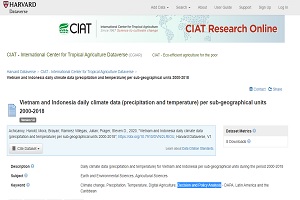Farmscape sustainability: a case study using an adaptation of the Sustainable Livelihood Framework in Caquetá, Colombia
A total of 341 households were interviewed, 176 (51.6%) in the Andean foothills (with cattle raising as a dominant activity), and 165 (48.4%) in the hillside area where crop farming is dominant. The sample is representative of the four municipalities, according to the Colombian Census carried out in 2005. We used a stratified optimal random sampling strategy across the number of rural households in the municipalities to account for the number of farms. The information was collected from March 2016 to October 2016. The primary purpose of the household-level survey was to understand and document the current socioeconomic conditions and farming practices and synthesize this information into a sustainability index. The data was collected through Android Devices using the software CsPro 6.2 and 6.3. (Reporte Interno: Linea Base Encuesta Socioeconomica Proyecto SAL, 2018) (2016)

